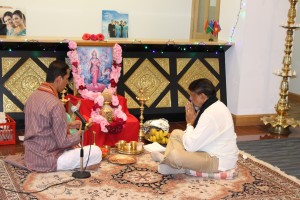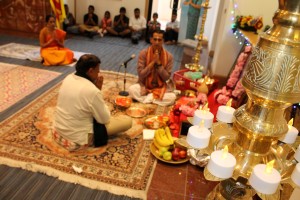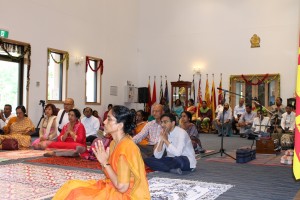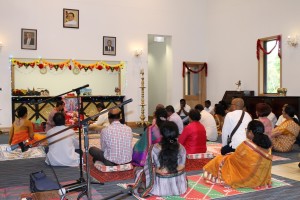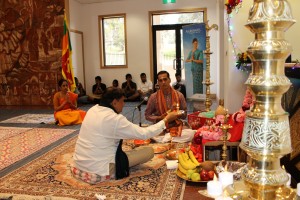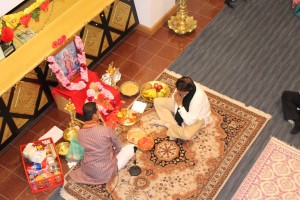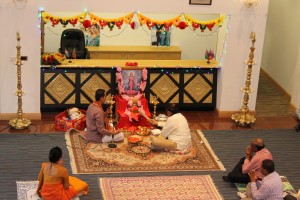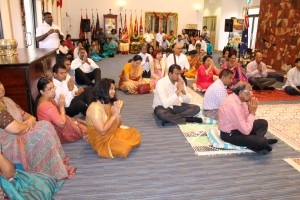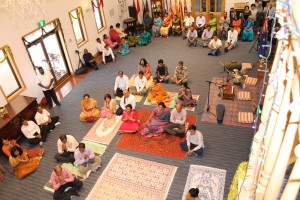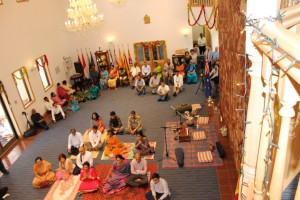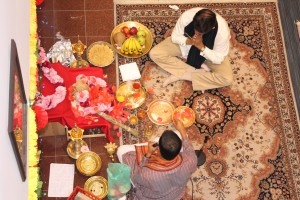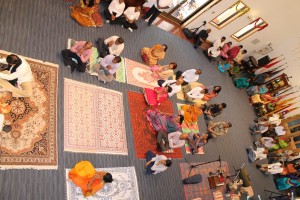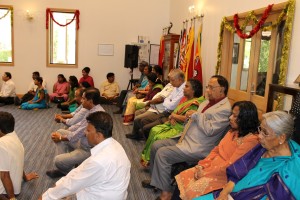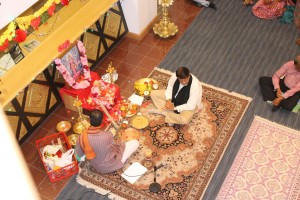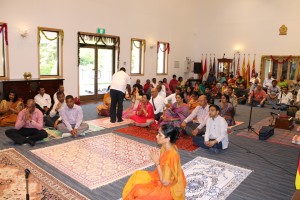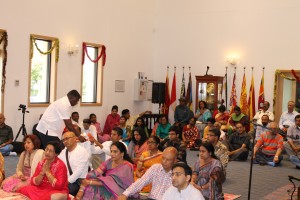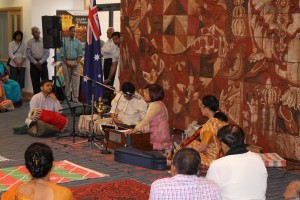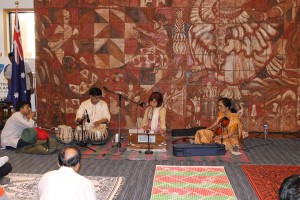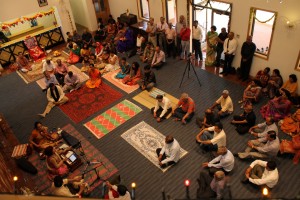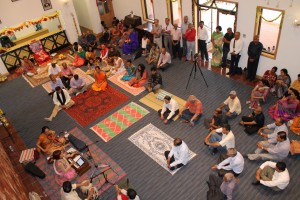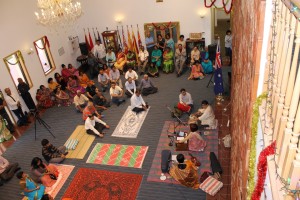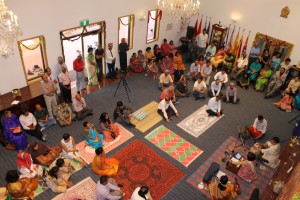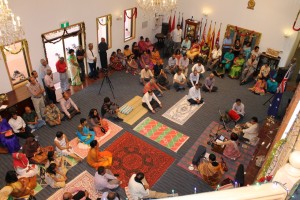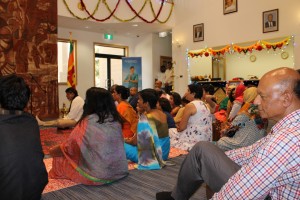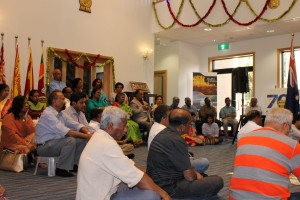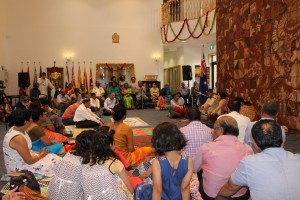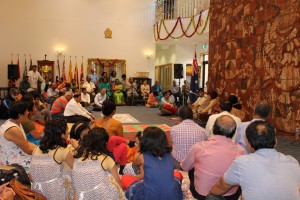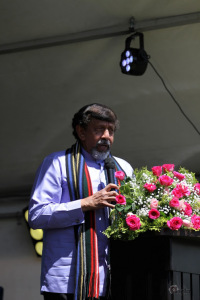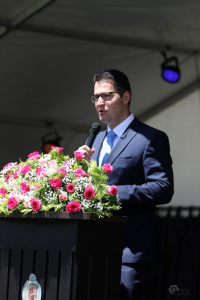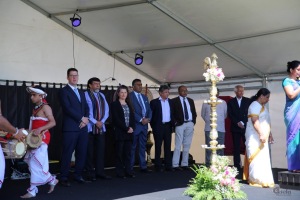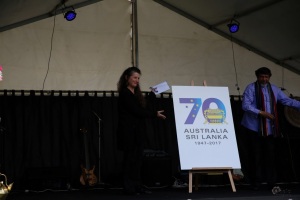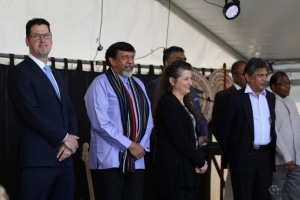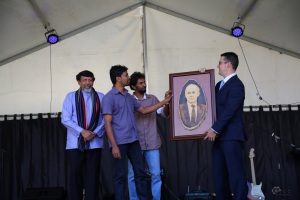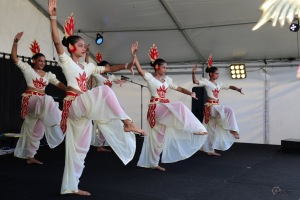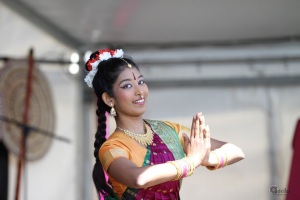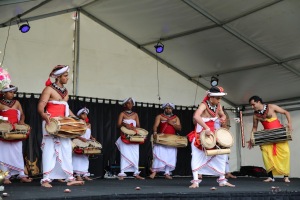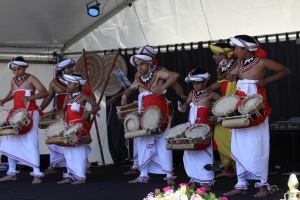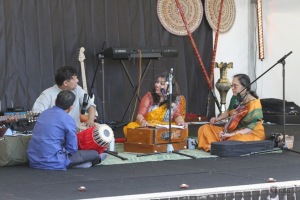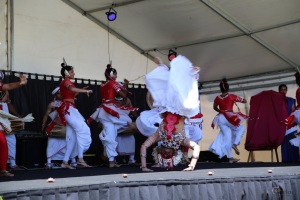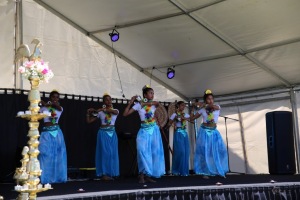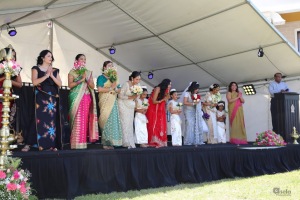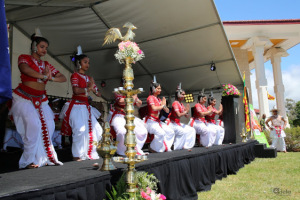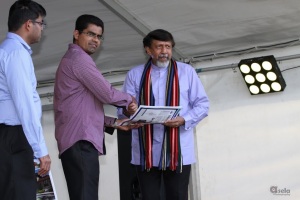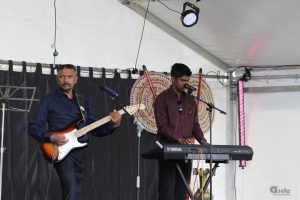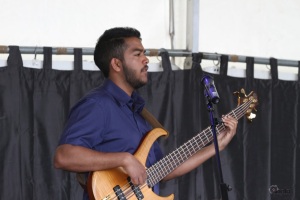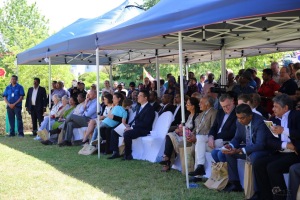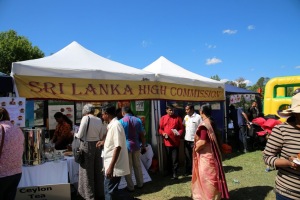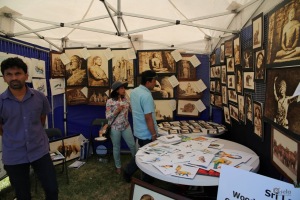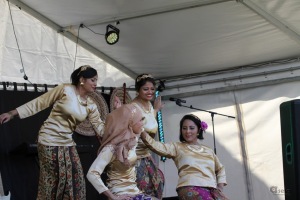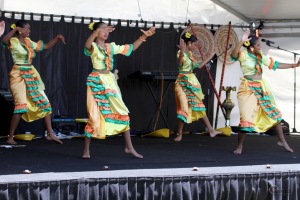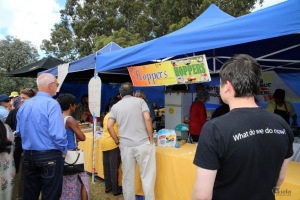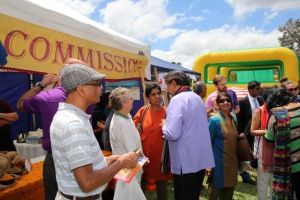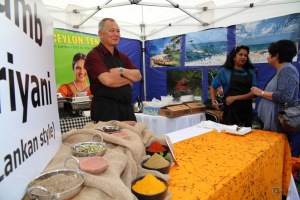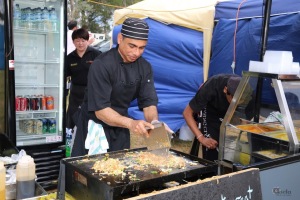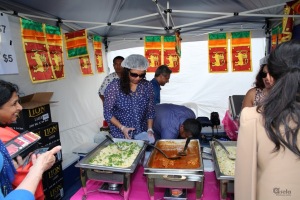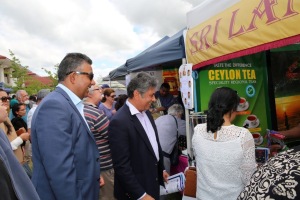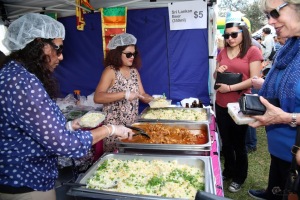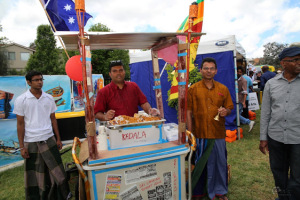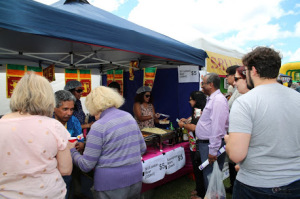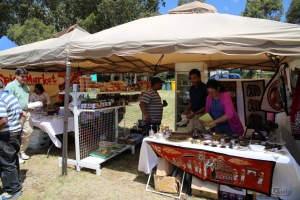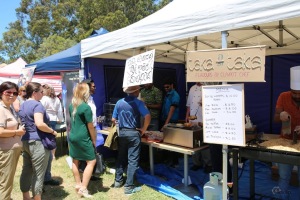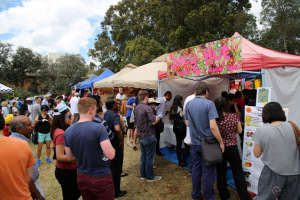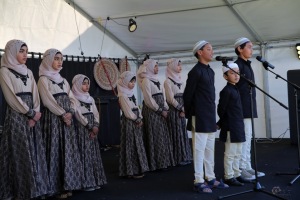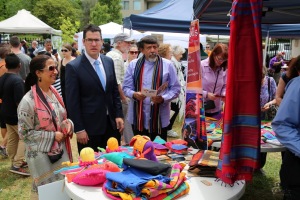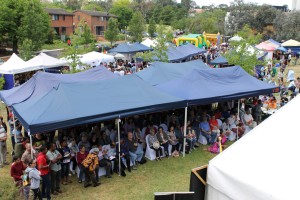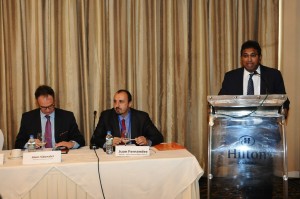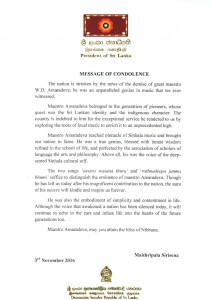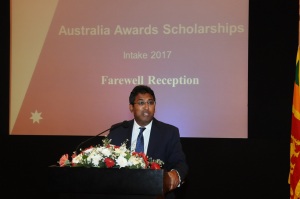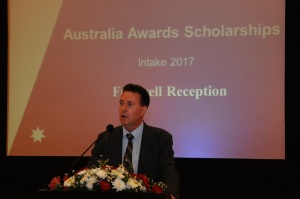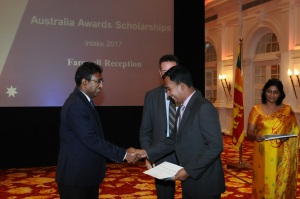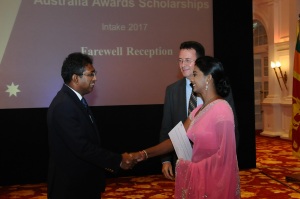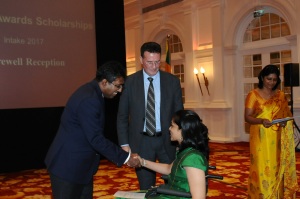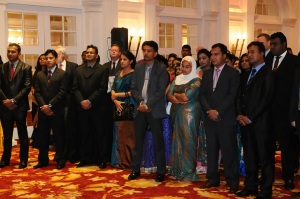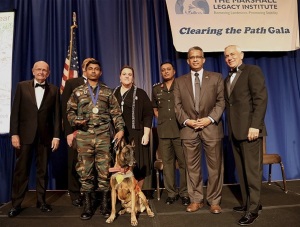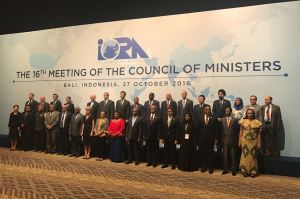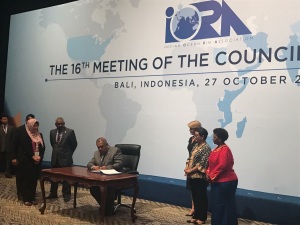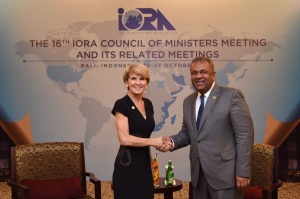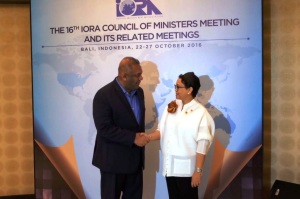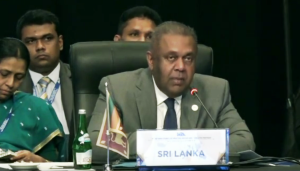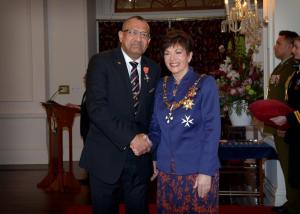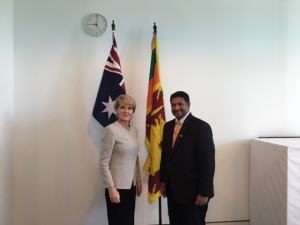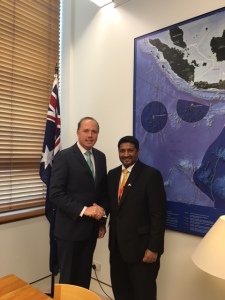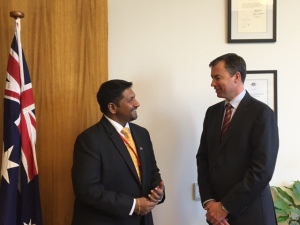


High Commission celebrated Deepavali with Canberra community
November 21, 2016
Deepvali was celebrated at the Sri Lanka High Commission in Canberra with the participation of the Sri Lankan community on Sunday 20th November.
Religious ceremony was conducted by Pandith Pradeep Bhat of the Vishnushiva Mandir. High Commissioner Skandakumar in welcoming the guests observed that the ‘Festival of Lights’. celebrated the triumph of good over evil and the emergence of light over darkness.” As we approach the end of yet another year, and reflect upon it “, he wished everyone the true blessings of Deepavali in the year ahead. Thereafter the guests were treated to a music performance coordinated by the Tamil community in Canberra followed by a reception with traditional snacks and Sri Lankan tea.
Sri Lanka Festival 2016 draws unprecedented crowds in Canberra
November 14, 2016
Canberra community came in large numbers to savour a bit of Sri Lanka at the Sri Lanka Festival organised by the High Commission on Saturday 12th November in the High Commission premises. Over 3000 people representing the Commonwealth and Australian Capital Territory (ACT) governments, diplomatic corps, and the local community visited the Festival and enjoyed Sri Lankan food, culture and crafts of Sri Lanka.
Australian Assistant Minister for Social Services and Multicultural Affairs Senator Zed Seselja was the Chief Guest. Former Sri Lanka cricketer Asanga Gurusinghe travelled all the way from Melbourne to be present at the Festival. Addressing the Opening Ceremony, the Assistant Minister emphasised the importance of multiculturalism for Australia, and congratulated the High Commission and the Sri Lankan community for coming together in promoting Sri Lanka.
High Commissioner Somasundaram Skandakumar in his welcome address appreciated the participation and contribution of all Sri Lankan communities in Canberra which made the event truly Sri Lankan and depicted the diversity of Sri Lankan society. The High Commissioner also thanked the participation of cultural groups from Canberra and Sydney adding colour to the Festival and entertaining the visitors throughout the day. He particularly underlined the collective effort of the High Commission and the Sri Lankan community that contributed to the success of the event. Volunteers played a valuable role in selling raffle tickets, managing and supervising the children’s play area, conducting creative activities for children, face painting, providing medical and nursing care, compering, photo and video recording of the event, technical skills with sounds and electric supply and by assisting in innumerable other ways. Many Sri Lankans commended the effective organising of the event while one senior member of the community described it as “the most successful event held in Canberra witnessed since 1974”.
A portrait of the Australian Prime Minister Malcolm Turnbull done on wood using pyrography was presented to the Chief Guest by artists Malaka and Mahesh from Thermal Arts, who had come all the way from Sri Lanka to take part in the Festival.
The official logo for the celebration of the 70th anniversary of diplomatic relations between Sri Lanka and Australia in 2017, designed by the Department of Foreign Affairs and Trade (DFAT), was launched at the Festival by the First Assistant Secretary for South and West Asia Division of DFAT Ms. Kathy Klugman and High Commissioner Skandakumar. First Assistant Secretary Klugman, who is a former High Commissioner to Sri Lanka, briefly outlined the history of the relationship between the two countries while the High Commissioner mentioned some of the activities being planned in 2017 to commemorate 70 years of friendship.
The participation of two Sri Lankan companies showcasing art and handlooms and an astrologer were special features at the Festival. The High Commission, with the assistance of the Consulate General office in Sydney, conducted a tourism and tea promotion stall. Sri Lanka Tourism Promotion Bureau, Sri Lanka Tea Board and SriLankan Airlines contributed to the success of the event providing the stage, advertisements, raffle prizes, and promotional material.
Sri Lanka High Commission in Australia
Canberra,
14th November 2016
More photos : https://goo.gl/photos/DcckyPEHw4zxJz248
Remarks by Deputy Foreign Minister Dr. Harsha de Silva at Regional Consultations on Transitional Justice in Asia-Pacific
November 14, 2016
Remarks by Hon. Dr. Harsha de Silva. Deputy Minister of Foreign Affairs
Regional Consultations on Transitional Justice in Asia-Pacific
Hilton Colombo, 9 November 2016
UN Special Rapporteur on the promotion of truth, justice, reparation and guarantees of non-recurrence, Mr. Pablo de Greiff,
Acting UN Resident Coordinator Mr. Alain Sibenaler,
Officials from the Office of the High Commissioner for Human Rights,
Ladies and Gentlemen,
It is a pleasure to be here with you this morning, and I extend to all of you, a very warm welcome to Sri Lanka.
I understand that this meeting brings together State representatives, representatives of transitional justice mechanisms, national human rights institutions, NGOs, victims groups, UN officials, and representatives of regional organisations from the Asia-Pacific region to discuss and share experiences on transitional justice processes in the region.
I was informed that in accordance with the mandate given by the Human Rights Council to the Special Rapporteur, he was requested by the Council to gather relevant information on national situations, including on normative frameworks, national practices and experiences; identify, exchange and promote good practices and lessons learned; and recommend ways and means to improve and strengthen the promotion of truth, justice, reparation and guarantees of non-recurrence.
Accordingly, regional consultations have so far been held for the Middle East and North Africa, Latin America and the Caribbean, Africa, and Europe and North America. The region of the Asia-Pacific is the last on the list.
I feel that we are fortunate that by accident or by design, the consultations for the Asia-Pacific was kept to be done last, giving us this wonderful opportunity to welcome not only Mr. Pablo de Greiff, but all of you, to Sri Lanka.
As you all know, since the election of President Maithripala Sirisena in a historical Presidential election last January, Sri Lanka has embarked on a process of reconciliation. The two main political parties in Sri Lanka – the Sri Lanka Freedom Party led by President Sirisena and the United National Party led by Prime Minister Ranil Wickremesinghe have come together to forge a Government of National Unity. This is a step that is unprecedented in our nation’s history. In the words of President Sirisena in his inaugural address to Parliament following the General Election last August, this was a necessary step to obtain the bipartisan consensus that is required to face the important challenges before our nation, which include reconciliation and peacebuilding.
Therefore, Ladies and Genetlemen, this is an important moment in our history. We have acknowledged and recognised the need for reconciliation and the important contribution that transitional justice can make to this process of healing. Sri Lanka’s co-sponsorship of Resolution 30/1 titled ‘Promoting reconciliation, accountability and human rights in Sri Lanka’ is a manifestation of our strong commitment to this process.
Several initial steps in this long journey that we have embarked upon have been taken already. This includes the setting up, through an Act of Parliament, an Office on Missing Persons which is a component of the truth-seeking process. The legislation for this was enacted in August and the procedural steps for its establishment including the nomination of members by the Constitutional Council are now underway. A Task Force was appointed early this year, by the Government, comprising members of civil society, to hold public consultations, involving all stakeholders, to seek their views on the mechanisms for truth-seeking, justice and reparations.
This important process of national consultations has just concluded and the Task Force is scheduled to hand over their report to the President and the Prime Minister, this month. The designing of the truth-seeking, justice and reparations mechanisms will be informed by the report of this Task Force.
At the same time, we have undertaken a process of constitutional reform. A Resolution for the Parliament to sit as a Constitutional Assembly for this purpose was passed unanimously by our Parliament. The various drafting committees are presently at work.
Ladies and Gentlemen,
The processes that are underway here are in fact too numerous to list out and what I listed out are just a few.
For this process in Sri Lanka to be successful, we have to also ensure that the people of our country receive a quick economic peace dividend, and this is also an area on which we are focusing significant attention at the moment.
As contexts differ and there are no cookie-cutter models that can be adopted in sensitive processes such as transitional justice, this is a journey that our nation has to undertake and chart on its own. Yet, we cannot afford to experiment or make mistakes. Therefore, we rely on technical expertise as well as advice, and Pablo and the OHCHR officers have been excellent partners to us in our journey.
We have a long way to go and I am sure we have a lot to learn from best practices elsewhere. This is probably true for a lot of you here as well. Reconciliation is not a box that can be ticked or a journey that can end as per a timeline. There are no magic portions to achieve what we set out to achieve. It requires hard work and constant striving, and a commitment towards which our nation should be bound across generations. National building and healing are not tasks that have an end. This, we understand; and we want to ensure that after so many years of conflict, our nation does not plunge into conflict once again. So with this aim in mind, we set out on pursuing transitional justice to build a nation which respects and upholds the rights of each and every individual citizen of our country.
I wish your deliberations all success, and I hope that while you are here, you would also find the time to enjoy Colombo and Sri Lanka.
Thank you.
President’s condolence message on the demise of Great Maestro W D Amaradeva
November 4, 2016
Source : http://www.president.gov.lk/
Remarks by Deputy Foreign Minister Dr. Harsha de Silva at the Australia Awards Reception
November 4, 2016
Remarks by Hon. Dr. Harsha de Silva, MP. Deputy Minister of Foreign Affairs
at the Australia Awards Reception Galle Face Hotel, 2 November 2016
His Excellency High Commissioner Bryce Hutchesson,
President of the Sri Lanka Association of Australia Awards Alumni Ms. Indrani Sugathadasa,
Australia Awards Recipients,
Alumni,
Distinguished guests,
Ladies and Gentlemen,
I am happy to join you this evening to congratulate the 30 recipients of this year’s Australia Awards Scholarships, and while congratulating the recipients, I would also like to thank the Government of Australia for this generous and important Programme which contributes to skills and capacity development of Sri Lankans, while strengthening people-to-people contact between our two countries.
Australia and Sri Lanka are the best of friends, except perhaps on the Cricket field. Diplomatic relations between Australia and Ceylon were established in April 1947, even before we gained Independence. But ties between our peoples existed even before this. After all, Australians were seafarers and travellers, and Ceylon was a regular port of call.
The Australian Imperial Force visited Colombo en route to Egypt; and many veterans passed through Colombo on their way back home from war. An unfortunate few are buried on this tropical island.
Colombo, I am told is the first overseas cricket venue at which Sir Don Bradman played way back in 1930.
The stream of Sri Lankans who has made Australia their home over the years from the different communities has contributed to the diversity of Australia’s multicultural society, and has also made a mark on Australia’s economy, the arts, business, literature, the legal field, the culinary field, and even cricket.
Australia has been a strong development partner over the years, and I do not think there is any sector in which Australia hasn’t extended a helping hand to Sri Lanka at some point or another.
Australia has helped so many of our students, administrators, and professionals acquire the skills and knowledge they require to contribute to Sri Lanka’s progress.
All of you who go out to Australia shortly must all be very eager and enthusiastic about what awaits you. I am confident that you will take maximum advantage of this wonderful opportunity to not only learn and enrich your knowledge, skills and expertise, in your chosen fields, but to also be Ambassadors for your country during the time that you spend in Australia.
Benjamin Franklin, I am told, had said that the purpose of education is not only to serve yourself but to serve your community, your nation, and your world. In economics we call this a positive externality.
Looking at the list of 30, I was impressed by the diversity of the scholarship recipient in terms of the fields of study, from –
- law
- development studies
- Education
- public Policy
- Business Administration
- Disability Policy
- Conflict Management
- International Development
- Developing Economics
- Agriculture Economics
- Human Resources Management
- Governance
- Public Administration
- Women’s studies
- Education
- and commerceI hope that each of you, with the knowledge and the skills that you acquire through this Programme will go on to serve our nations and our world with distinction.High Commissioner Hutchesson, I must use this opportunity to say a special thank you to you and your team at the Australian High Commission in Colombo for the wonderful work that you do all year round to make our countries and our peoples draw closer.
Thank you.
MINE DETECTION DOG (MDD) TEAM OF THE SRI LANKA ARMY SELECTED AS 2016 TEAM OF THE YEAR
October 31, 2016
At the Annual “Clearing the Path” Gala 2016 organized by The Marshall Legacy Institute (MLI) of Washington D.C., Mine Detection Dog (MDD) Alvin and its handler Lance Corporal Nawarathne of the Sri Lanka Army Engineers Humanitarian Demining Unit, were selected as the MDD team of the year.
The Marshall Legacy Institute, an organization dedicated to “removing landmines and promoting stability” has been assisting the Sri Lanka Army Humanitarian Demining Unit in their humanitarian effort to clear landmines and explosive devices from affected regions in Sri Lanka. Over the years, MLI has provided 26 Mine Detection Dogs and training with the assistance of private donors and the U.S. Department of State.
At the gala event to celebrate the work of demining canines worldwide and to seek contributions for this purpose, the Sri Lankan Mine Detection Team led by Brigadier Amith Senevirathna, Brigade Commander of Sri Lanka Army Engineers Humanitarian Demining Unit, together with the mine detection dog Alvin and its handler were recognized for their contribution to the successful demining efforts in Sri Lanka.
Ambassador Susan Rice, National Security Advisor of the United States, was the keynote speaker at this event, which was graced, among other dignitaries, by Senator Mike Enzi and General Gordon Russell Sullivan, manifesting commitment of the United States for mine clearing efforts.
Introducing the Sri Lankan Mine Detection and Removal Team at this event, Ambassador Prasad Kariyawasam stated that “my country was heavily contaminated with mines and other improvised explosive devices due to nearly three decades of armed conflict between government forces and the Liberation Tigers of Tamil Eelam, better known as the LTTE. This terrible conflict ended in 2009 with the comprehensive defeat of the LTTE, which has been identified as a Foreign Terrorist Organization by the United States. But uncleared mines and unexploded explosives have posed a formidable challenge to the well-being of the people, especially in the north of Sri Lanka.”
He further stated that “Sri Lanka is now happy to announce that seven years since the end of the conflict, 92% of the mine infected land has been cleared and declared suitable for human habitation and use. This, compared with other mine and unexploded ordinance infected countries in the world, is a major achievement in terms of the speed of clearance of unexploded explosives. A substantial part of the credit for this success must go to the MDD teams working in Sri Lanka.” Full Statement is attached.
“Sri Lanka wishes to see the Indian Ocean Rim Association move into a new era of dynamism”- Foreign Minister Samaraweera
October 28, 2016
Foreign Minister Mangala Samaraweera called for the Indian Ocean Rim Association (IORA) to move into a new era of dynamism, when he addressed the 16th Council of Ministers Meeting (CoMM) of IORA held on 27th October 2016 in Bali, Indonesia.
In his address, the Foreign Minister stated that it was necessary for IORA and the members to take collective steps to ensure the security of the Indian Ocean, including the freedom of navigation, aviation and adherence to international law including UNCLOS, enhance scientific and academic cooperation amongst IORA members, protect, preserve and use ocean resources sustainably guided by international law and the United Nations Sustainable Development Goals, eenhance preparedness to deal with ocean based disasters and un-assessed impact of climate change on ocean weather, establish mechanism for development finance within IORA and expand and broad base IORA’s partners for more intense and meaningful cooperation.
Speaking further, Foreign Minister Samaraweera also stated that Sri Lanka has been focusing on the Blue Economy due to the economic potential it offers and the availability of aquatic resources, and observed that blue economy-related initiatives have the potential to uplift the economic conditions of the people.
Moving on to the many developments that are currently taking place across the world, the Minister pointed out to the need to measure the progress made so far by IORA, in order to chart a course for greater regional collaboration. In this context, he stated that sharing experiences in joint projects and technical co-operation amongst IORA states in order to ensure the sustainable use of the ocean resources would be useful.
Minister Samaraweera also stated that Sri Lanka is co-hosting the Second Water Working Group meeting and Ocean Forecasting Workshop to Build Capacity for Indian Ocean Operational System, in Colombo, in mid-November this year, which was also in line with Sri Lanka’s commitment to strengthen the cooperation with IORA.
Noting the progress made in the areas of economic empowerment of women and the institutional strengthening of the IORA, the Foreign Minister added that on the eve of IORA’s 20th Anniversary in 2017 and the proposed Leader’s Summit in 2017, Sri Lanka was keen to further enhance its role in IORA. He also called for a more meaningful engagement of IORA’s dialogue partners in a constructive manner and to further explore mechanisms to encourage more interaction and participation among the stakeholders.
Prior to his address, Foreign Minister Samaraweera also signed the IORA Memorandum of Understanding (MoU) between the Governments of the Member States of the IORA for the Coordination in Search and Rescue Services in the Indian Ocean Region.
The Minister also expressed condolences to the Minister of Foreign Affairs of Indonesia, Madam Retno Marsudi, on the passing away of her father, before commencing his address.
The IORA, initially formed in 1997 as the Indian Ocean Rim Association for Regional Cooperation (IOR-AC), later became known as IORA in 2010. It currently consists of 21 member countries.
On the sidelines of the CoMM, Foreign Minister Samaraweera also held bilateral discussions with the Foreign Ministers of Indonesia and Australia, in addition to a meeting with the Deputy Minister of International Relations and Cooperation of South Africa.
Ministry of Foreign Affairs
Colombo
27th October 2016
Foreign Minister Mangala Samaraweera signed the IORA Memorandum of Understanding (MoU) between the Governments of the Member States of the IORA for the Coordination in Search and Rescue Services in the Indian Ocean Region. Looking on is the Secretary General of IORA, Ambassador K. V. Bhagirath
Statement by Foreign Minister Mangala Samaraweera at the IORA Ministerial Meeting: 27th October 2016
October 28, 2016
Hon. Ministers,
Excellencies,
Distinguished Delegates,
I wish to first express my deepest condolences to Her Excellency Madam Retno Marsudi, Minister of Foreign Affairs of Indonesia, on the passing away of her beloved father. Our thoughts are with Her Excellency and the family at this time of grief.
It gives me great pleasure to be amidst a distinguished gathering of the 16th Ministerial Meeting of the Indian Ocean Rim Association (IORA) in this idyllic island of Bali.
I convey our deep gratitude to the Government of Indonesia for the warm hospitality and excellent arrangements.
We are confident that the meetings will be fruitful and would take us closer to our common objectives and collective vision for IORA under the effective and able leadership of Indonesia. The contribution made by the previous Chairs is much appreciated while the Secretary General and his staff also deserve our appreciation for their efforts.
I am pleased to have just signed the IORA MoU on Coordination in Search and Rescue Services in the Indian Ocean Region.
Excellencies,
Notable progress has been made during the past year, in the areas of the blue economy, women’s economic empowerment and institutional strengthening of the IORA.
On this occasion, I wish to share a few thoughts on some matters which are of interest to the IORA member states.
Naturally, in a direct line from the south of Sri Lanka, where I come from, to the Antarctic, there is little land but a vast ocean. The Blue Economy has emerged as a sector of seminal importance to IORA members including Sri Lanka. The ocean based resources in the Indian Ocean are amongst the greatest assets we possess and Blue economy-related initiatives have the potential to tremendously uplift the economic conditions of our peoples.
Therefore, the establishment of the Centre of Excellence on Ocean Sciences and the Environment in Sri Lanka, is timely. Although not fully functional, this Centre would, inter-alia, build capacities of the associated institutions and specialists/experts in the region and serve as a knowledge hub.
The IORA Whale and Dolphin Watching Workshop held in Colombo this year facilitated networking among IORA member States and partners and helped to expand our expertise in sustainable whale and dolphin watching tourism.
We also look forward to the participation of all IORA members at the Second Water Working Group meeting and Ocean Forecasting Workshop to Build Capacity for Indian Ocean Operational System, in Colombo, on 15-16 and 17-18 November respectively.
Excellencies,
Vast changes have taken place across the political spectrum in Sri Lanka with the establishment of the National Unity Government following the Presidential and Parliamentary elections in 2015. The consensus based governance forms the basis of our pursuance of an open, transparent agenda to strengthen democracy and its structures, and economic progress.
Outreach and engagement remain the hallmark of our new foreign policy and in this context Sri Lanka has sought to share our expertise in sectors such as education, human resource development and health – areas in which we have achieved a level of particular excellence.
Sri Lanka remains open to international trade, offering an investor friendly atmosphere, and encouraging foreign direct investment aimed at achieving greater integration into the world economy.
Distinguished delegates,
We look forward to the first IORA Summit in Indonesia in March 2017 commemorating the 20th Anniversary of IORA. We step forward in confidence aiming to further strengthen IORA’s role as a dynamic forum in maritime safety and security, trade and investment facilitation, tourism and culture, academic, science and technology, fisheries and disaster risk management, among others. We need to measure progress and chart a course for a more dynamic, action oriented regional collaboration. We believe that the Concord should be a visionary document with the Action Plan providing concrete initiatives.
Sri Lanka wishes to see IORA moving into a new era of dynamism. Accordingly, we must take collective steps to:
Ensure the security of the Indian Ocean, including the freedom of navigation, freedom of overflying and adherence to international law including UNCLOS.
Enhance scientific and academic cooperation amongst IORA countries.
Protect, preserve and use sustainably the valuable ocean resources, guided by international law and the United Nations Sustainable Development Goals.
Enhance preparedness to deal with ocean based disasters and un-assessed impact of climate change on ocean weather.
Establish mechanism for development finance within IORA.
Expand and broad base IORA’s partners for more intense and meaningful cooperation.
As IORA is at the threshold of its 20th Anniversary, it is timely that a process be set in motion with a view to setting up a new vision to chart the organization’s future. This should include engaging our dialogue partners more constructively and exploring mechanisms to encourage more interaction and participation.
Excellencies, Distinguished delegates,
I look forward to a constructive dialogue and greater interaction on the ways and means to further strengthen IORA, assess its place in the network of international organizations and the possibilities of greater engagement for the mutual benefit of all the Member States with renewed optimism and vigor.
Sri Lanka will continue to play its part in taking IORA forward into a new era of dynamism.
I thank you.
Sri Lanka’s Hony. Consul in New Zealand receives Order of Merit
October 27, 2016
Sri Lanka’s Hony. Consul in New Zealand Aruna Abeygoonasekera received recognition in Her Majesty’s Birthday Honours when he was admitted as a Member of the New Zealand Order of Merit, an Order of Chivalry in New Zealand’s honour system established in 1996 by Queen Elizabeth the II.
The award was in recognition of his services to New Zealand – Sri Lanka relations and to the Sri Lankan community as Hony. Consul in New Zealand since 2007.
Aruna Abeygoonasekera being congratulated by Her Excellency Dame Patsy Reddy,
Governor General of New Zealand, upon receiving the award.
Visit of Hon Ruwan Wijewardena, State Minister for Defence to Australia
October 12, 2016
The State Minister for Defence, Hon Ruwan Wijewardena, who was in Australia on the invitation of the Australian government, met the Minster of Justice and Minister Assisting the Prime Minister on Counter Terrorism Michael Keenan, Minister of Foreign Affairs Julie Bishop, and the Minister of Immigration and Border Protection Peter Dutton at the Parliament House on 12th October.
Register with the High Commission
The Sri Lankan High Commission in Canberra would like to keep in touch with Sri Lankans and persons of Sri Lankan origin living in Australia, New Zealand, Fiji, Papua New Guinea, Vanuatu and other Pacific Islands as well as Sri Lankan community organisations in those countries.
If you are a current/former Sri Lankan or an office bearer of a Sri Lankan community organisation we invite you to register with the High Commission.
RegisterAddress
Sri Lanka High Commission
61, Hampton Circuit
Yarralumla
ACT 2600

